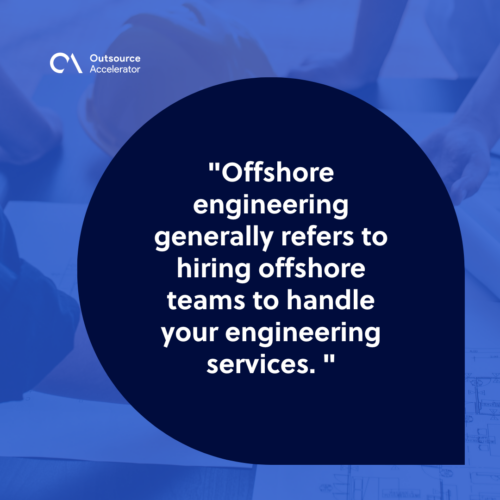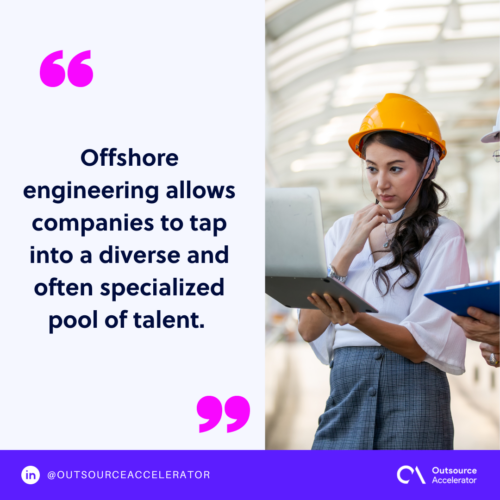A quick guide to offshore engineering

Offshore engineering has emerged as a strategic business practice for those wishing to harness the benefits of international collaboration.
Companies can access a vast pool of skilled engineering professionals by outsourcing work to competent offshore partners.
This has only been accelerated by the increasing demand for digital capabilities, as Bain and Company notes. Within the next three years, 60% of engineering executives plan to increase their outsourcing efforts.
However, deciding to offshore engineering services comes with opportunities and challenges.
This article examines the world of offshore engineering services, exploring its benefits, potential challenges, and key considerations to ensure a seamless transition.
Whether you’re a small startup or a large enterprise, understanding the dynamics of offshore engineering can be a game-changer.
What is offshore engineering?
Offshore engineering generally refers to hiring offshore teams to handle your engineering services. It encompasses a wide range of activities, including:
- Software development
- Product prototyping and design
- Manufacturing support
- Research and development
- Technical support
More specifically, it’s also a specialized branch of engineering that deals with the design, construction, installation, and maintenance of structures in offshore environments. This typically refers to the marine habitat beyond the shoreline.
Offshore engineering addresses the unique challenges of offshore conditions, such as:
- Extreme weather
- Corrosive marine elements
- Deepwater operations
The discipline integrates various engineering principles to ensure the safe and efficient operation of projects that exploit marine resources. These resources can be used for energy, transportation, and research.

Industries that do offshore engineering
Offshore engineering finds applications in multiple industries, especially those that operate in marine environments.
Some of the key industries that extensively utilize offshore engineering include:
Defense and security
Offshore engineering is employed in constructing naval bases, offshore surveillance systems, and other defense-related structures.
Submarine pens and coastal defense installations are projects requiring specialized offshore engineering expertise.
Oil and gas
Offshore engineering plays a crucial role in the exploration, extraction, and processing of oil and gas reserves located beneath the seabed.
This involves designing and constructing offshore drilling platforms, subsea pipelines, and oil and gas production facilities.
Renewable energy
Offshore engineering is integral to developing renewable energy resources at sea.
Some examples of projects are offshore wind farms and renewable energy platforms. These require specialized engineering solutions for designing and installing wind turbines to harness energy sources efficiently.
Maritime transportation
The shipping and maritime transportation industry heavily relies on offshore engineering. This industry benefits from the following:
- Port infrastructure
- Navigation systems
- Offshore structures like jetties and breakwaters
Telecommunications
Submarine communication cables, which are crucial for global connectivity, are a product of offshore engineering. Engineers design and install these undersea cables to establish reliable communication links between continents.
Environmental research and exploration
Offshore engineering supports scientific research, environmental monitoring, and exploration activities. This includes the deployment of buoys and sensors for data collection and oceanographic studies.
These industries highlight the diverse applications of the discipline of offshore engineering. Many more industries can reap the benefits by offshoring their engineering services to skilled talent abroad.
Benefits of offshore engineering
Engaging in offshore engineering can provide several benefits for companies:
Cost savings
The potential for significant cost savings is one of the primary motivations for companies to offshore engineering.
When compared to industrialized countries, offshore sites frequently provide reduced labor expenses. This allows corporations to take advantage of qualified and skilled engineers from providers like SixEleven at a more affordable rate.
This also extends to opportunities for cost-effective training and skill development.
Global access
Offshore engineering allows companies to tap into a diverse and often specialized pool of talent. By expanding your search globally, you can access engineers with specific skills that may be in high demand or scarce locally.
Offshore engineering can also serve as a strategic entry point into new markets. Establishing new engineering operations can foster international collaborations and partnerships.

Increased efficiency and productivity
With round-the-clock operations and a distributed workforce, companies can achieve higher productivity levels through offshore engineering. This is especially true when offshore teams are aligned with onshore counterparts to optimize schedules.
This results in faster project turnaround times and a quicker time-to-market.
Scalability and flexibility:
Offshore engineering allows companies to quickly scale up or down their engineering teams based on project requirements. This flexibility is valuable when resources need to be rapidly ramped up for large-scale projects.
Focus on core competencies
By offshoring engineering work, companies can redirect internal resources to focus on core business functions, innovation, and strategic initiatives. This enhances overall operational efficiency.
While these benefits exist, it’s important for companies to carefully evaluate their offshoring strategies and consider different factors to ensure a successful venture.
Challenges of offshore engineering
Offshore engineering comes with its own set of challenges that companies must navigate to ensure successful and sustainable operations.
Here are some common challenges companies face when offshore engineering:
Communication and cultural barriers
Cultural differences and miscommunications pose a significant challenge. Companies must invest in cultural training and foster an inclusive work culture to mitigate these.
Quality assurance and control
Maintaining consistent quality standards can be challenging when engineering work is offshored.
Companies must establish robust quality control measures and ensure that offshore teams adhere to the same standards as onshore ones.
Coordination and project management
Managing offshore engineering teams requires effective coordination and project management.
This includes:
- Setting clear expectations
- Establishing efficient workflows
- Implementing project tracking and reporting mechanisms
Lack of coordination can lead to delays, cost overruns, and reduced project efficiency.
Legal and regulatory compliance
Adhering to diverse international regulations and compliance standards can be complex. Organizations must navigate legal requirements and employment laws in both onshore and offshore locations.
Offshore engineering tips to remember
When a company decides to do offshore engineering work, it’s important to consider several key tips to ensure a successful transition.
Here are some tips for companies when offshoring engineering:
- Define clear objectives. Clearly articulate the goals of offshoring engineering activities. Having a clear vision will help you guide your strategy and decisions.
- Conduct thorough location research. Carefully select the offshore location based on factors like talent availability, infrastructure, political stability, and cultural compatibility.
- Choose the right offshore partner. Look for an offshore engineering partner with a solid track record, expertise in your industry, and a proven ability to deliver. Consider visiting the facility to assess its capabilities firsthand.
To ensure they meet your standards, consider visiting their facility to assess their capabilities firsthand. Trusted providers like Offshore MVP offer site visits, allowing you to observe their daily operations up close.

- Establish clear communication strategies. Establish clear communication channels and protocols with your offshore team to align expectations, provide feedback, and ensure project success.
- Invest in knowledge transfer. Implement a structured knowledge transfer process to ensure that critical information and expertise are effectively shared.
- Address cultural differences. Foster a collaborative and inclusive working environment that values diverse perspectives. Encourage activities that build strong, cohesive teams.
- Monitor and evaluate performance. Define clear performance metrics and KPIs to monitor the effectiveness of your offshore engineering initiatives.
- Continuously improve and refine. Regularly assess your offshore engineering strategy, identify areas for optimization, and implement necessary adjustments.
Remember these tips, and you can enhance the success of your offshore engineering initiatives, fostering collaboration, innovation, and efficiency across global teams.







 Independent
Independent




